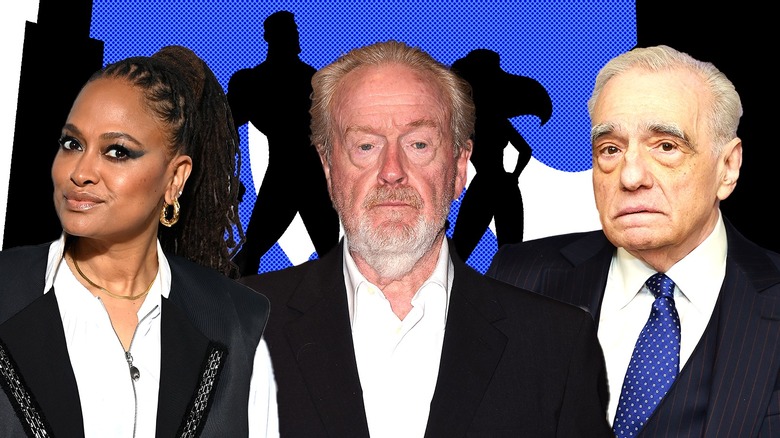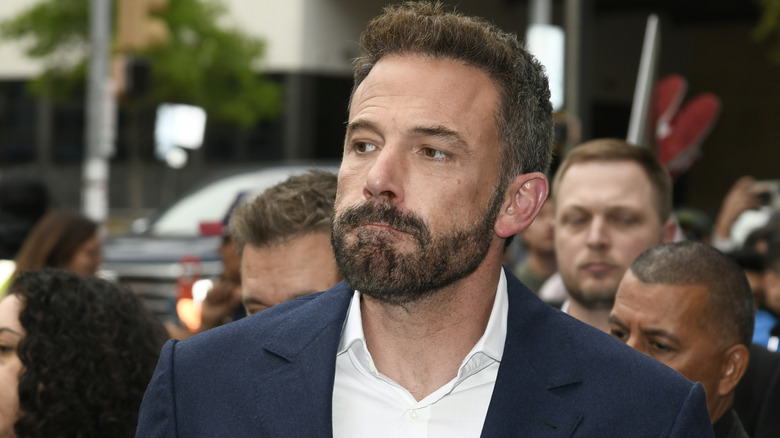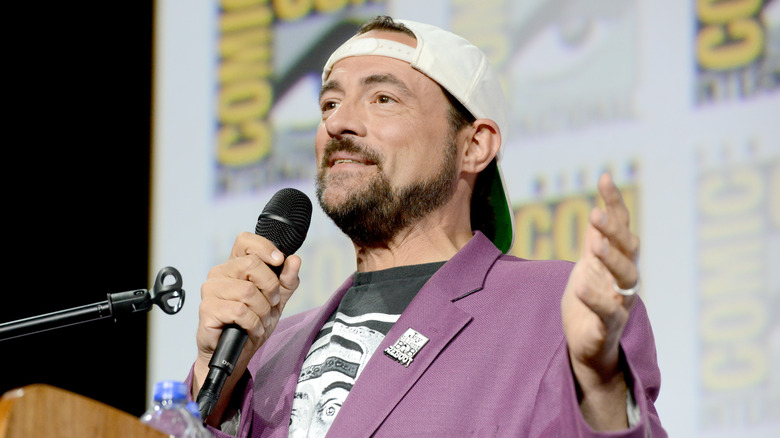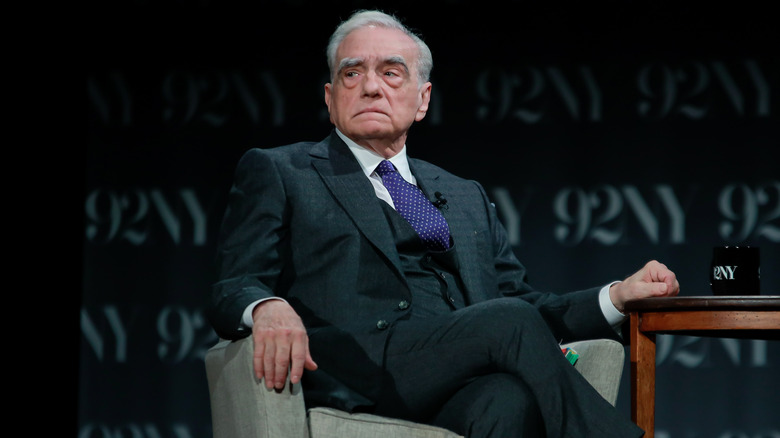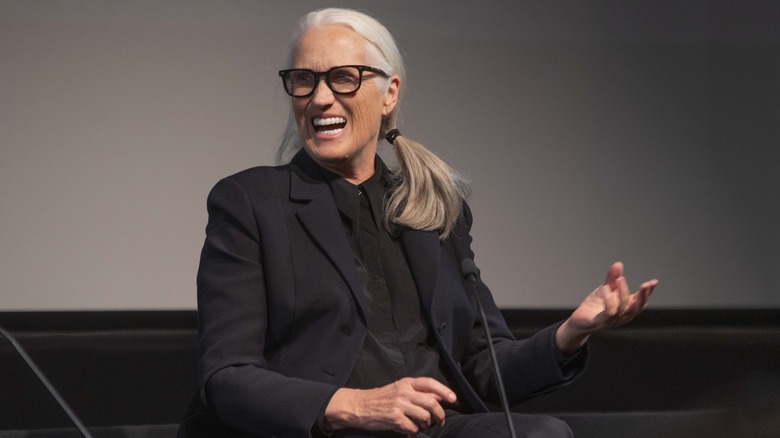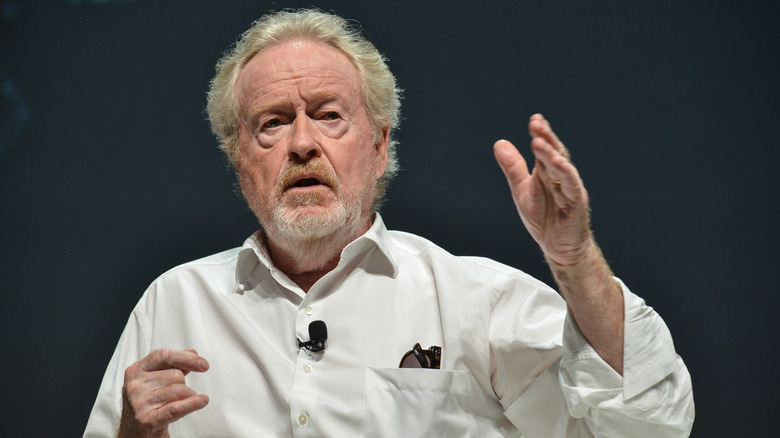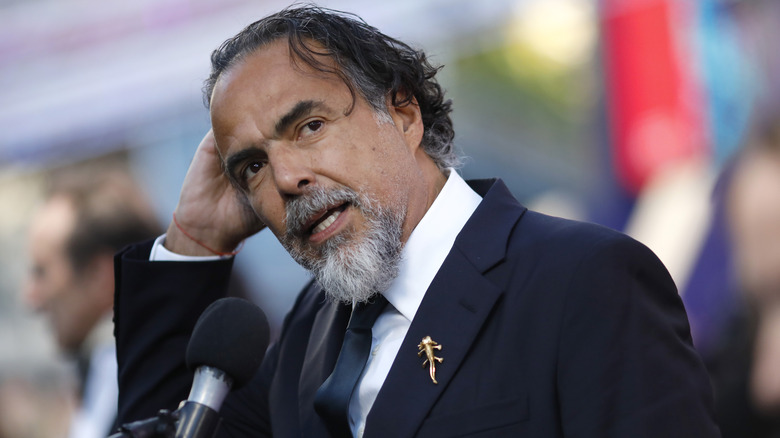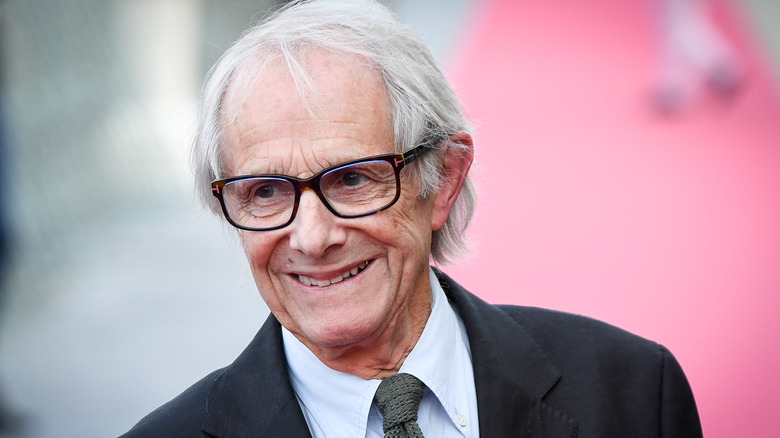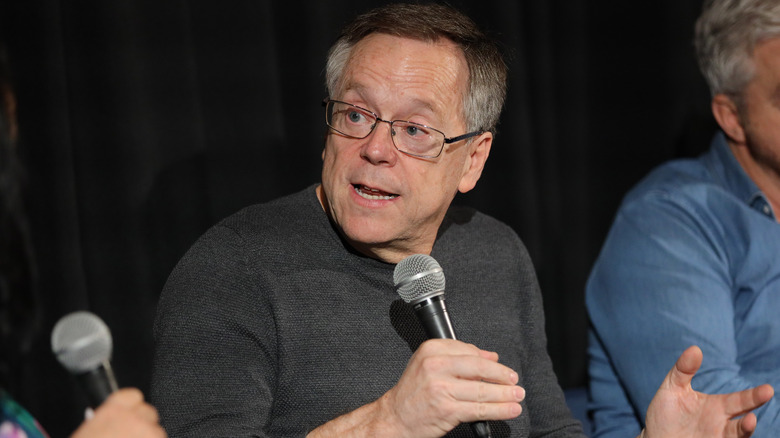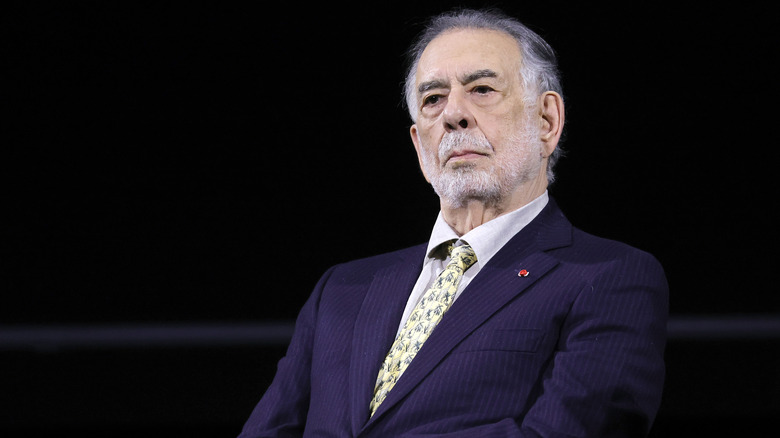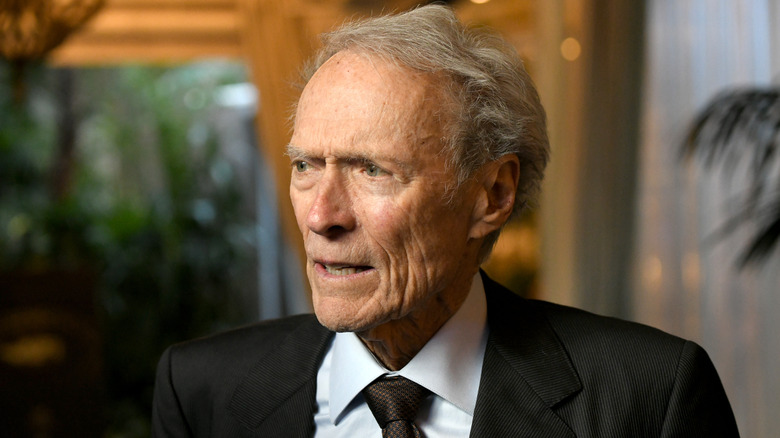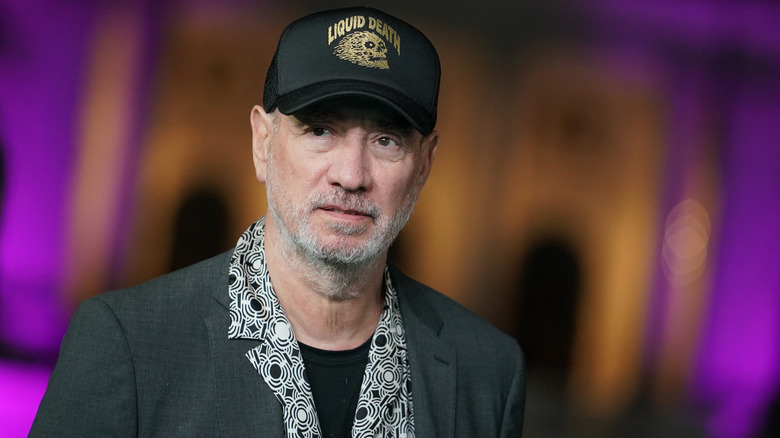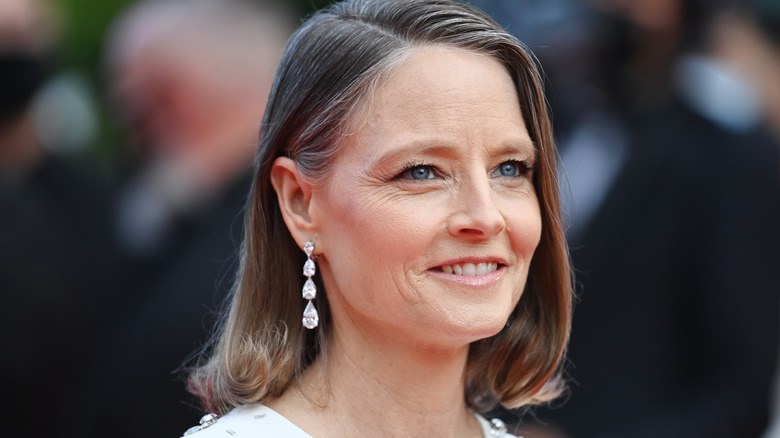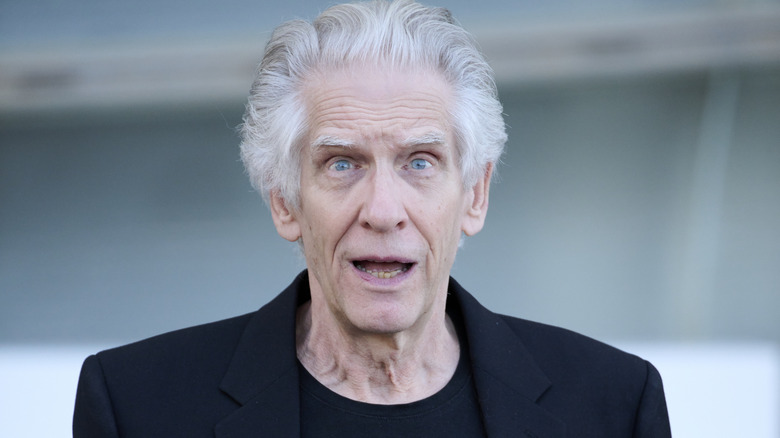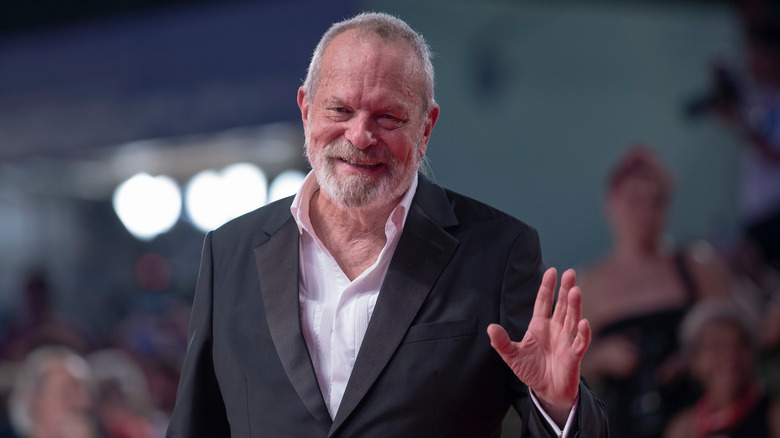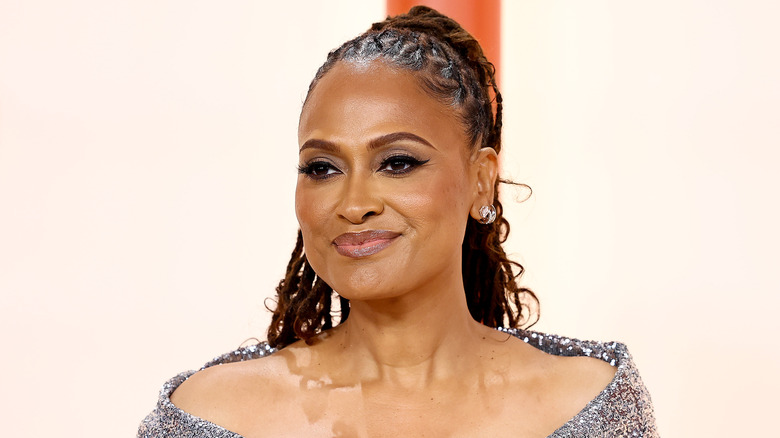Directors Who Refuse To Direct A Superhero Movie
Out of the top ten domestic box office earners in 2022, half of them were superhero movies. All of them were sequels. With Marvel and DC dominating the film industry with record-breaking box office numbers, audience adoration, and studio priority, you would think directors would be jumping at the opportunity to get in on the action. But not everyone is so eager to hop on the bandwagon.
In fact, many of Hollywood's biggest directors have a bone to pick with the abundance of superhero movies overshadowing other projects and original stories. Some simply find the obsession with formulaic adaptations, sequels, and reboots uninspiring, while others believe the entire genre is destroying the sanctum of filmmaking and artistic expression. To find out if your favorite director has sworn off capes and tights, here's your trusty guide to directors who have gone on record refusing to direct a superhero movie.
Ben Affleck
Coming off the heels of "Batman v Superman: Dawn of Justice" and "Justice League," the cape crusader himself, Ben Affleck, was gearing up to write, direct, and star in a solo film known as "The Batman." While the excitement and anticipation were growing, Affleck was dealing with his own troubles behind the scenes, both professionally and personally.
Years after stepping away from "The Batman" altogether, Affleck opened up to The Hollywood Reporter, revealing that the "Justice League" production had left "the most monstrous taste" in his mouth and worsened his reliance on alcohol in the aftermath of his separation from Jennifer Garner. "But really what it was is that I wasn't happy. I didn't like being there. I didn't think it was interesting," he told long-time friend Matt Damon in an interview for Entertainment Weekly.
Affleck's disinterest extends further than just the Dark Knight. When discussing the superhero genre, he told THR, "I don't condescend to that or put it down, but I got to a point where I found it creatively not satisfying." Affleck sealed the deal when answering a follow-up question about whether he would direct something for the new James Gunn-Peter Safran regime at DC. "Absolutely not. I have nothing against James Gunn. Nice guy, sure he's going to do a great job. I just wouldn't want to go in and direct in the way they're doing that."
Kevin Smith
Unlike most directors on this list, Kevin Smith is a self-proclaimed fan of the superhero genre, an appreciation that runs as deep as owning his own comic book store (Jay and Silent Bob's Secret Stash) and writing a handful of comics such as "Spider-Man/Black Cat: The Evil That Men Do" and "Guardian Devil." But when it comes to directing superhero movies, Smith prefers to stay in his own lane, telling Looper in an exclusive interview, "I'm not talented enough to do that stuff. You look at those movies, man. That takes a real visionary to pull that stuff off."
Instead, he feels inspired by the high-budget action films to continue making the types of projects he's best known for, indie comedies. "I watch a Marvel movie and I'm going to make 'Clerks III.' Because I see people doing what they're exceptionally good at and reminds me to go do what I consider myself to be exceptionally good at." Ultimately, this lifelong fan would much rather stay just that: a fan.
Martin Scorsese
"Taxi Driver" and "Goodfellas" director Martin Scorsese earned a reputation as one of Hollywood's most influential figures with his gritty, emotional approach to classic cinema. In many ways, his work is the antithesis of the speculative nature of high-action, special-effects superhero movies. So it doesn't come as a surprise that the director has some choice words for the genre.
"I don't see them," Scorsese told Empire. "I tried, you know? But that's not cinema. Honestly, the closest I can think of them, as well-made as they are, with actors doing the best they can under the circumstances, is theme parks. It isn't the cinema of human beings trying to convey emotional, psychological experiences to another human being." His opinions were received with heated backlash from a mass of dedicated fans of the genre.
In response, Scorsese wrote a piece for The New York Times to defend himself. "Some people seem to have seized on the last part of my answer as insulting, or as evidence of hatred for Marvel on my part. If anyone is intent on characterizing my words in that light, there's nothing I can do to stand in the way." He then doubled down, saying, "Nothing is at risk ... They are sequels in name but they are remakes in spirit, and everything in them is officially sanctioned because it can't really be any other way."
Jane Campion
When you think of director Jane Campion and her award-winning films, you may feel compelled to label her a feminist icon, a cinematic trailblazer, or a revolutionary artist. But if there's one thing never to mistake her for, it's a superhero fanatic. "I hate them. I actually hate them," Champion revealed to Variety at the 2021 AFI Fest screening of "The Power of the Dog."
The sentiment didn't end there. "They're so noisy and like ridiculous. Sometimes you get a good giggle, but I don't know what the thing is with the capes, a grown man in tights. I feel like it must come from pantomime." Her response on whether or not she would direct a superhero film was forthright: "I think it's safe to say that I will never do that." For those who ever dreamed Campion would shake up the genre by giving one of the many women superheroes the meaningful screen time they deserve, you can lay those hopes to rest.
Ridley Scott
Though he's dabbled in just about every genre, Ridley Scott is best known for his atmospheric and immersive world-building in sci-fi films such as "Blade Runner," "Alien," and "Prometheus." Therefore, the idea of Scott directing a superhero movie doesn't seem that far off. Unfortunately, this isn't the case.
When speaking to Digital Spy, Scott revealed he's turned down several opportunities to contribute to the Marvel and DC universes, saying they're "not my kind of thing." He adds, "I can't believe in the thin, gossamer tight-rope of the non-reality of the situation of the superhero." Scott even made a comparison to "Blade Runner," saying, "I've done that kind of movie — 'Blade Runner' really is a comic strip when you think about it, it's a dark story told in an unreal world. You could almost put Batman or Superman in that world, that atmosphere, except I'd have a f***ing good story, as opposed to no story!"
Alejandro G. Iñárritu
After watching Alejandro G. Iñárritu's satirical commentary on cinema's obsession with superheroes in his film "Birdman," it's easy to guess the director's feelings towards the genre. The black comedy follows a washed-up superhero actor trying to revive his career. Besides the overall plot, several of the lead actors have ironic connections to the superhero genre, with Michael Keaton, Edward Norton, and Emma Stone each having been in part defined by their turns as Batman, The Hulk, and Gwen Stacy, respectively.
When discussing superhero movies with Deadline, Iñárritu said, "I think there's nothing wrong with being fixated on superheroes when you are seven years old, but I think there's a disease in not growing up. The corporation and the hedge funds have a hold on Hollywood and they all want to make money on anything that signifies cinema."
He went on to add, "I sometimes enjoy them because they are basic and simple and go well with popcorn. The problem is that sometimes they purport to be profound, based on some Greek mythological kind of thing ... They have been poison, this cultural genocide, because the audience is so overexposed to plot and explosions and s*** that doesn't mean nothing about the experience of being human." In addition to his opinions, Iñárritu revealed that he's been offered the opportunity to join superhero projects in the past but has always rejected them.
Ken Loach
Audiences appreciate director Ken Loach for his politically-charged social commentary surrounding the working class. "Sorry We Missed You" introduces a family struggling to recover from the aftermath of the 2008 financial crash. "I, Daniel Blake" follows a middle-aged, out-of-work carpenter navigating the flawed welfare system. "The Angels' Share" is a portrait of a father with a criminal record trying to turn his life around for the better.
Based on Loach's filmography, a movie about a superhero wouldn't fit unless they used their powers to advocate for something along the lines of improving funding for schools in low-income neighborhoods. Even then, Loach isn't interested. "They're made as commodities like hamburgers, and it's not about communicating and it's not about sharing our imagination," Loach told Sky News. "It's about making a commodity which will make a profit for a big corporation — they're a cynical exercise. They're market exercise and it has nothing to do with the art of cinema."
Fernando Meirelles
During a masterclass at the 2019 Mumbai Film Festival, "City of God" and "The Two Popes" director Fernando Meirelles chimed in on Scorsese's highly publicized sentiments and added, "I can't disagree with Scorsese because I don't watch [Marvel movies] ... I'm not interested."
Although Meirelles isn't likely to make a superhero movie of his own, the director admitted to sitting through a "Spider-Man" and a "Deadpool" movie. "Deadpool 2," on the other hand, was a no-go. "It doesn't mean it is bad," Meirelles offered, explaining that they're just not his cup of tea. "I can't engage with the story, I get sleepy. Sometimes I watch those at the cinema and after half an hour I am sleepy. It's very overwhelming. It doesn't interest me at all," he told The Hollywood Reporter. But what else is expected from a director who leads with gritty realism? It's hard to blame Meirelles for his honesty.
Francis Ford Coppola
Not many people have been as vocal about their criticisms of the superhero genre as Francis Ford Coppola. As one of the largest branches making up the prestigious Coppola family tree, the director is as worthy as anyone to have a say on what makes great cinema. His word of advice, as he told GQ: "If you're going to make art, let it be personal. Let it be very personal to you." As for the movies currently dominating box offices, Coppola insists, "What is a Marvel picture? A Marvel picture is one prototype movie that is made over and over and over and over and over again to look different."
Coppola justified his claims even further in an interview with Deadline, saying, "Personally I don't like the idea of franchises, the notion that you can keep repeating what is essentially the same movie for financial gain — in other words, what is a formulaic approach." He followed up by defending fellow creative Scorsese. "Marty Scorsese says that the Marvel picture is not cinema, he's right because we expect to learn something from cinema, we expect to gain some enlightenment, some knowledge, some inspiration. Arguably, I don't know that anyone gets anything out of seeing the same movie over and over again, which is the Marvel movies." And with that, the Godfather of Hollywood has spoken.
Clint Eastwood
Dirty Harry himself, Clint Eastwood, is known for his no-nonsense western action, with larger-than-life characters not too far off from the superhuman heroes we see fighting crime on screen more and more often. But check Eastwood off as another director who finds the superhero genre child's play. "I read comic books when I was a kid; I don't read them now," he confessed during CinemaCon 2015 (via Variety). "I prefer adult-oriented pictures. I mean that in the PG-13 or R sense, but that's as far as it goes."
Eastwood has yet to act or direct in any superhero movies, meaning his opinion has probably yet to change all these years later. Perhaps Eastwood was turned off to the idea of action sequences and special effects after his 1982 film "Firefox" was panned by critics. Even so, there's a big enough audience out there that would much rather indulge in stories of redemption and justice through Eastwood's signature rugged style.
Roland Emmerich
While most directors on this list stay clear of large-scale action sequences and special effects, "Independence Day" and "The Day After Tomorrow" director Roland Emmerich is famous for exactly those things. Therefore, his strong stance against the influx of superhero movies is slightly more surprising. When asked by Den of Geek if the disaster genre has changed in recent years, Emmerich responded, "Oh yes. Because naturally Marvel and DC Comics, and Star Wars, have pretty much taken over. It's ruining our industry a little bit, because nobody does anything original anymore."
It's not so much the superheroes themselves that are the problem (although the director has admitted to The Guardian that he finds it "silly when someone dons a superhero suit and flies"), but rather the unoriginal copy-and-pasting of ideas that make it harder for filmmakers like Emmerich to get original stories funded. "You should make bold new movies, you know? And I think, actually, Christopher Nolan is the master of that. He is someone who can make movies about whatever he wants. I have it a little bit harder, but I still have a big enough name — especially when it's a disaster [movie] or has some sort of disaster theme."
Jodie Foster
Scorsese wasn't the only director to use the overwhelming, commodity-driven nature of theme parks as an analogy. In an interview with Radio Times, "Little Man Tate" and "The Beaver" director Jodie Foster compared going to the movies to the experience of theme parks.
"Studios making bad content in order to appeal to the masses and shareholders is like fracking — you get the best return right now but you wreck the earth," she explained. "It's ruining the viewing habits of the American population and then ultimately the rest of the world. I don't want to make $200 million movies about superheroes."
The wording may be harsh to some, but with more than 50 years of working in the industry under her belt, the message holds weight. At the end of the day, the only way Foster would ever direct a superhero movie is if it had "really complex psychology."
David Cronenberg
Considering David Cronenberg's specialty in the body horror genre, it's not the biggest twist that the director isn't keen on trying his hand at superheroes. On the other hand, something along the lines of the superhero satire series "The Boys" could possibly pique his interest. But before "The Boys" hit Amazon Prime Video, Cronenberg was asked by The Hollywood Reporter if he'd ever consider taking on the genre. The director didn't hold back on his response.
"I don't think they are making them an elevated art form. I think it's still Batman running around in a stupid cape. I just don't think it's elevated." He continued, "A superhero movie, by definition, you know, it's comic book. It's for kids. It's adolescent in its core. That has always been its appeal, and I think people who are saying, you know, 'Dark Knight Rises' is supreme cinema art, I don't think they know what the f*** they're talking about." It seems Cronenberg has long moved on from his comic book reading days.
Terry Gilliam
The inherent childlike nature of superhero movies is a common sentiment among directors on this list, with "Brazil" and "The Man Who Killed Don Quixote" director Terry Gilliam echoing these comments in an interview with CineNando. When asked how his adventure comedy "Don Quixote" fits into an industry monopolized by superhero movies, Gilliam spoke his mind, saying, "I hate superheroes. It's bulls***. Come on, grow up! We're not going to be teenagers for the rest of our lives."
Instead, Gilliam suggests we need more "peace, love, and understanding." He continued, "It's great to dream of great powers. Superheroes are all about power. That's what I don't like about superheroes." Gilliam's words may come as a disappointment for some. Who knows — the director's distinct surreal imagination could be exactly what the superhero genre needs to transcend to the status of high art, but it seems like we may never know.
Ava DuVernay
Award-winning director Ava DuVernay has made cinematic history time and time again, so approaching DuVernay with an opportunity to take on Marvel's "Black Panther" was a no-brainer for Marvel. As we know now, the job would go to Ryan Coogler, but why exactly did DuVernay turn down the offer?
In an interview with Essence, DuVernay expressed her decision with the utmost respect. "I think I'll just say we had different ideas about what the story would be. Marvel has a certain way of doing things and I think they're fantastic and a lot of people love what they do. I loved that they reached out to me." She continued by saying, "I loved meeting Chadwick and writers and all the Marvel execs. In the end, it comes down to story and perspective. And we just didn't see eye to eye. Better for me to realize that now than cite creative differences later."
Despite this incompatible experience with Marvel, DuVernay attempted to work on the DC movie "New Gods" before the entire project was scrapped in 2021. After two misses from Marvel and DC, it wouldn't come as a surprise if DuVernay passed on any future offers.
